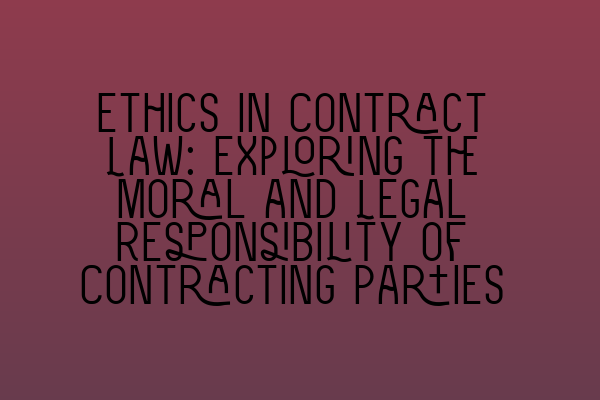Ethics in Contract Law: Exploring the Moral and Legal Responsibility of Contracting Parties
In the world of contract law, ethics play a crucial role in ensuring the fair and just execution of agreements between parties. At its core, contract law is about upholding obligations and commitments made by individuals or organizations through legally binding contracts. However, the ethical considerations that underpin these agreements go beyond mere legal obligations.
When entering into a contract, both parties have a moral responsibility to act in good faith, engage in fair negotiations, and fulfill their contractual duties. This article will dive deep into the moral and legal dimensions of ethical conduct in contract law.
The Principles of Ethical Conduct in Contract Law
1. Honesty and Truthfulness: A fundamental principle of contract law is that all parties involved must be honest and truthful in their dealings. This includes providing accurate information, disclosing any relevant facts, and not misleading or deceiving the other party.
2. Fairness and Equality: Contract law requires that parties engage in fair negotiations, ensuring equal bargaining power and reasonable terms. Unfair advantage or exploitation of a weaker party is considered unethical and could render a contract voidable or unenforceable.
3. Good Faith: Acting in good faith means approaching contractual relationships with honesty, integrity, and genuine intentions to fulfill obligations. Parties must refrain from engaging in fraudulent, deceptive, or dishonest practices to gain an unfair advantage.
4. Confidentiality and Privacy: Contracts often involve sensitive information, and both parties have a duty to maintain confidentiality and respect the privacy of each other’s data, trade secrets, or intellectual property. Breaching this duty can lead to legal consequences and tarnish one’s reputation.
5. Compliance with Laws and Regulations: Contracting parties must comply with all relevant laws and regulations governing their contractual relationships. Ignoring legal requirements can lead to legal disputes, penalties, and potential damage to one’s professional standing.
Legal Ramifications for Breach of Ethical Conduct
Failure to adhere to ethical standards in contract law can have serious legal ramifications. If a party breaches the ethical principles discussed above, the other party may have legal remedies available to them:
– Rescission: If a contract was entered into based on fraudulent misrepresentation or deceit, the innocent party may seek rescission, which renders the contract void and restores the parties to their pre-contractual position.
– Damages: If one party suffers financial losses due to the other party’s breach of ethical conduct, they may seek monetary compensation for those losses through legal remedies such as damages.
– Specific Performance: In certain cases, a court may order the breaching party to fulfill their contractual obligations through specific performance. This remedy is often sought when monetary compensation would be inadequate.
It is crucial for contracting parties to understand that ethical conduct is not just a moral responsibility but a legal one as well. Upholding ethical values strengthens the integrity and fairness of the contract law system.
Conclusion
Ethics plays a central role in contract law, ensuring that parties act in good faith and fulfill their obligations. From honesty and fairness to confidentiality and compliance with laws, the principles of ethical conduct guide the behavior of contracting parties. Breaching ethical standards can have severe legal consequences, ranging from rescission to damages. Aspiring solicitors must familiarize themselves with the ethical dimensions of contract law to become competent professionals.
If you’re interested in pursuing a legal career, make sure to check out our related articles:
- Securing Training Contracts: A Roadmap to Becoming a Solicitor
- Mentorship for Aspiring Solicitors: Nurturing Talent in the Legal Field
- Legal Challenges and Pitfalls: Navigating the Complexities of the Legal System
- The GDL (Graduate Diploma in Law): A Pathway to Becoming a Solicitor
- Mastering the Solicitor’s Path: Prepare for the Journey Ahead
